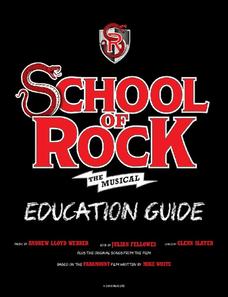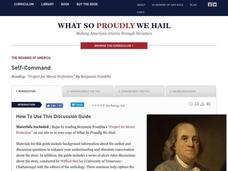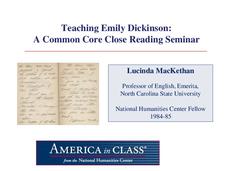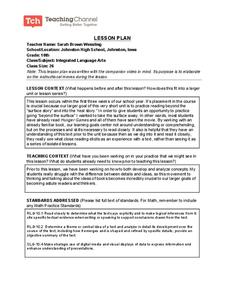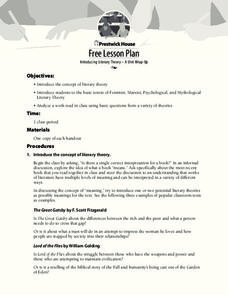National Endowment for the Humanities
How "Grand" and "Allied" Was the Grand Alliance?
Learn more about the Grand Alliance with a scaffolded lesson plan that includes four activities. Class members use primary sources to complete a map exercise, understand the goals and objectives of each individual nation, and participate...
University of Virginia
Uncle Tom's Cabin: Finishing the Novel
The reviews for Harriet Beecher Stowe's Uncle Tom's Cabin were as divisive as the novel itself. High schoolers finish the novel unit with an evaluation of the book's initial reviews, its characters' dreams and fears of emancipation, and...
University of Virginia
Uncle Tom's Cabin: Reading the Novel
Teach the importance of context and perspective with a unit focused on Harriet Beecher Stowe's Uncle Tom's Cabin. The first lesson considers the role of female characters and readers, including the gender expectations of the time. The...
University of Virginia
Uncle Tom's Cabin: Starting Out
Prior knowledge is key when starting any novel unit, but it's essential before introducing Uncle Tom's Cabin by Harriet Beecher Stowe. Three lessons provide primary documents, historical discussions, and extended reading activities that...
Main Memory Network
Longfellow's "The Village Blacksmith" and Whitman's "Song of Myself"
Although the work Americans do has changed over time, the plight of the American worker has largely remained the same. Facilitate a class discussion aboutAmerican workers using Henry Wadsworth Longfellow's "The Village Blacksmith" and...
Portland Public Schools
Teaching Tone to Teenagers
Tone is a tough topic to teach to teenagers. But never, fear, help is here in the form of a unit plan that takes advantage of their interest in music to set the stage for a series of activities that lead them to understand how setting,...
iTheatrics and Broadway
School of Rock the Musical: Education Guide
That old fashioned rock and roll comes alive as theatre arts students prepare to attend a live performance of the musical School of Rock. Packed with both pre- and post-production materials, the guide has it all. Rock on!
What So Proudly We Hail
The Meaning of America: Self-Command
Even for one of the most accomplished men in American history, there was room for improvement. Challenge high schoolers to use Benjamin Franklin's Project for Moral Perfection to analyze text, make inferences, connect to historical...
Candace Fleming
Ben Franklin’s Almanac: Being a True Account of the Good Gentleman’s Life
Candace Fleming's award winning Ben Franklin's Almanac is the anchor text for a classroom guide that provides teachers with a cache of pre, during, and post-reading activities.
Houghton Mifflin Harcourt
A Reader's Guide: The Lord of the Rings
Delve into the delightful depths of J.R.R Tolkien's The Lord of the Rings with a thought-provoking reader's guide. With literary questions for the novel as well as the subsequent The Two Towers and The Return of the King, the guide is a...
Houghton Mifflin Harcourt
The Hobbit
From dragons to dwarves, from riddles to rings, the great adventure story of The Hobbit by J.R.R. Tolkien has captivated generations of readers of all ages. An educator's guide explores the novel's literary elements, including the...
Independence Public Library
Unmasking the Truth Behind the Red Death
"The Masque of the Red Death" provides readers with an opportunity to research and plan a presentation about a topic related to Edgar Allen Poe's classic short story.
Illinois Mathematics and Science Academy
A Search for Symbolism in The Great Gatsby
After reading The Great Gatsby, groups return to the text and note passages where Fitzgerald uses symbols and color imagery in his narrative. They then develop a presentation that explains the context, the implications, and possible...
Annenberg Foundation
Gothic Undercurrents
Terror, mystery, excitement. American writers of the 19th century, including Nathaniel Hawthorne, Herman Melville, and Emily Dickinson, used these elements to create morally ambiguous tales that challenged the prevailing belief in...
Prestwick House
Night
Elie Wiesel's harrowing nonfiction tale of the Holocaust, Night, is the topic of a literary crossword puzzle. Class members review key names, places, and details from the book as they complete the puzzle.
National Humanities Center
Teaching Emily Dickinson: A Common Core Close Reading Seminar
Three of Emily Dickinson's poems, "I like to see it," "Because I could not stop for Death," and "We grow accustomed to the Dark," provide instructors with an opportunity to model for class members how to use close reading strategies to...
Prestwick House
The Help
Kathryn Stockett's The Help opened up a rich, vivid world of strong female characters and stark societal injustices. As high schoolers read the novel, they complete a crossword puzzle that includes clues from all chapters of the book.
Prestwick House
Heart of Darkness
There may be plenty of horror in Joseph Conrad's novel Heart of Darkness, but studying the details of the plot doesn't need to be horrific. High schoolers complete a short crossword puzzle to review the names, events, and relationships...
Teaching Channel
Storyboard Lesson Plan
Good books are accessible through a variety of literary lenses. To consider how the same story can be seen in different lights, groups develop a storyboard for a movie teaser that would focus on one of six concepts found in Suzanne...
Prestwick House
Introducing Literary Theory – A Unit Wrap-Up
Literary theories are lenses through which a text may be analyzed. The question in this lesson plan is how a particular literary lens can influence the reader's view of the text.
Prestwick House
New (March 2016) SAT Reading Test Practice
The SAT. The ACT. AP exams. The very mention of these exams can cause the college bound to feel anxious. One way to combat Test Anxiety is to provide high schoolers with models of these tests and give them opportunities to analyze the...
Prestwick House
Poe’s “The Raven” – Unity of Effect
How do Poe's choices of imagery, rhythm and rhyme scheme, and structure help build the desired single effect of "The Raven"? After listening to a dramatic reading of the poem, class members consider whether Poe's choices do create a...
Prestwick House
Teaching Shakespeare: Sonnet 73
It's that time of year to consider how Shakespeare selects his images and structures his Sonnet 73 to develop the meaning of the poem. Class members examine the rhyme scheme, the indented lines, the conceit, and the images used in each...
Prestwick House
"Because I could not stop for Death" -- Visualizing Meaning and Tone
Emily Dickinson's "Because I could not stop for Death" provides high schoolers with an opportunity to practice their critical thinking skills. They examine the images, diction, rhythm, and rhyme scheme the poet uses and consider how...








